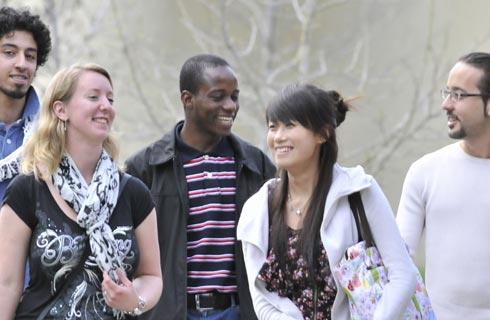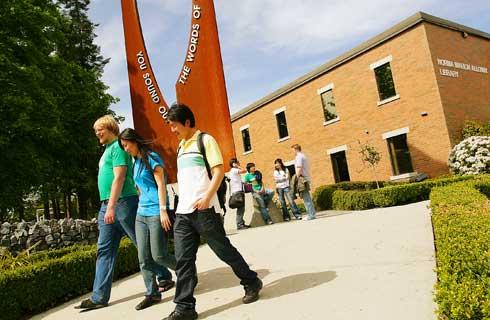理学硕士信息与图书馆研究
MSc/PgDip Information and Library Studies

学历文凭
Masters Degree (Taught)

专业院系
Computer and Information Sciences

开学时间

课程时长

课程学费

国际学生入学条件
IDP—雅思考试联合主办方

雅思考试总分
6.0
- 雅思总分:6
- 托福网考总分:73
- 托福笔试总分:160
- 其他语言考试:PTE - 60 overall, with a minimum of 59 in each component
CRICOS代码:
申请截止日期: 请与IDP联系 以获取详细信息。
课程简介
Study with us Our MScPgDip Information & Library Studies is a conversion degree, designed specifically for graduates from any discipline.Previous students have joined us from a variety of backgrounds, including history, English literature, forensic science, psychology, chemistry and linguistics.accredited by the Chartered Institute of Library and Information Professionalsincorporates international reciprocal agreements with professional bodies in the US, Canada, Australia and New Zealandbenefit from the practical experience of a placement Why this course This internationally-recognised, professionally-accredited conversion degree will provide you with a pathway into a continuously-evolving and exciting profession which supports and underpins the economic fabric of society. For international applicants, this CILIP-accredited degree offers reciprocal accreditation in countries including the USA, Australia, Canada, New Zealand, and others. This means you can come to Scotland to study and work back home as a qualified information professional, or go abroad to work if you are from the UK. Meeting the information needs of society is at the core of the work of the information professional. This programme will provide you with a range of skills in high demand from employers. These include the ability to organise, synthesise, and make use of information for the advancement of society. Suitable for those holding an undergraduate degree from any discipline, the degree will prepare you for a wide range of positions in the information field.
相关申请
 预科
预科 奖学金
奖学金 实习机会
实习机会 在校学习
在校学习 跨境学习
跨境学习 校园授课-线上开始
校园授课-线上开始 在线/远程学习
在线/远程学习
开学时间&学费
学费信息仅供参考,请与IDP联系以获取详细信息
| 开学时间 | 时长 | 学费 | 地点 |
|---|
学校排名

世界排名401
数据源:
泰晤士高等教育世界大学排名
关于思克莱德大学

斯特拉斯克莱德大学是一所领先的国际科技大学,位于英国最大城市之一格拉斯哥的中心地带。它是一个充满活力的国际社区的所在地,有来自140多个国家的近30000名学生。这所大学有着200多年的历史,在这段时间里,它继续提供优秀的学术教学和世界一流的研究,通过灵活、创新的学习方法,帮助学生为自己选择的职业做好最充分的准备。该大学强调实用、有用的学习以及与行业、商业和政策制定者的紧密联系,为毕业生在学习之外的快速变化、竞争激烈的环境做好准备。在斯特拉斯克莱德学生受益于: 世界一流的教学和研究:作为一所屡获殊荣的大学,斯特拉斯克莱德大学以其卓越的学术交付和创新而闻名。 强大的行业合作伙伴关系:斯特拉斯克莱德与劳斯莱斯、西门子、阿斯利康和巴布科克等全球组织密切合作,确保教学反映现实世界的实践和未来的行业需求。 尖端设施: 耗资6000万英镑的学习与教学楼和耗资8900万英镑的技术与创新中心为学习和研究提供了完美的环境。 全球视野:A真正的国际社会,通过世界各地的伙伴关系和研究联系联系联系在一起。 动态城市中心位置:校园位于英国最令人兴奋的城市之一格拉斯哥市中心,是体验繁荣的文化景观、探索标志性建筑和体验世界闻名的友好氛围的基地。
本校相关课程

MEng海军建筑与高性能船用车辆
学历文凭
Bachelor Degree
开学日期
课程费用总额


工程学与海洋工程学硕士
学历文凭
Bachelor Degree
开学日期
课程费用总额


工学海军建筑与海洋工程
学历文凭
Bachelor Degree
开学日期
课程费用总额


机械工程与材料工程学硕士
学历文凭
Undergraduate Masters
开学日期
课程费用总额


机械工程与财务管理学
学历文凭
Undergraduate Masters
开学日期
课程费用总额


机械工程与航空工程学
学历文凭
Undergraduate Masters
开学日期
课程费用总额

其他相关课程

Information Systems and Information Management MSc
 利兹大学
利兹大学泰晤士高等教育世界大学排名:118
学历文凭
Masters Degree (Taught)
开学日期
课程费用总额


信息系统科学硕士
 萨里大学
萨里大学泰晤士高等教育世界大学排名:244
学历文凭
Masters Degree (Taught)
开学日期
课程费用总额


商业硕士-信息系统
 昆士兰大学
昆士兰大学泰晤士高等教育世界大学排名:80
学历文凭
Masters Degree (Coursework)
开学日期
课程费用总额


Bachelor of Design - Information Environments
 昆士兰大学
昆士兰大学泰晤士高等教育世界大学排名:80
学历文凭
Bachelor Degree
开学日期
课程费用总额


MSc Information Systems
 朴茨茅斯大学
朴茨茅斯大学泰晤士高等教育世界大学排名:490
学历文凭
Masters Degree (Taught)
开学日期
课程费用总额


数据科学硕士
 悉尼大学
悉尼大学泰晤士高等教育世界大学排名:54
学历文凭
Masters Degree (Coursework)
开学日期
课程费用总额










